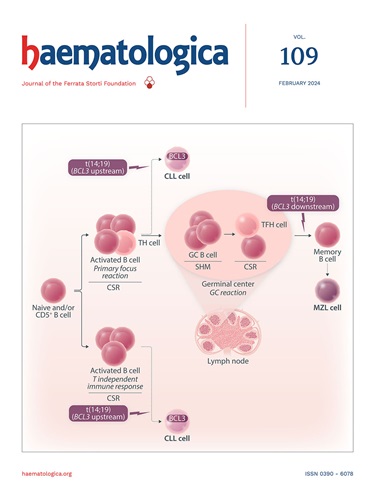Revised renal stratification and progression models for predicting long-term renal outcomes in immunoglobulin light chain amyloidosis.
IF 8.2
1区 医学
Q1 HEMATOLOGY
引用次数: 0
Abstract
Renal prognosis in light-chain amyloidosis (AL) is determined by categorizing patients into three renal stages at diagnosis and assessing Renal Response or Renal Progression following chemotherapy after 6 months. We evaluated, in a test (N=1935) cohort of patients with renal AL amyloidosis who were followed for a median of 95 months, a modified 4-stage model where Renal Stage 2 was sub-categorized according to preserved (2A) or reduced (2B) estimated Glomerular Filtration Rate (eGFR). A hybrid model for evaluation of Renal Progression was also introduced, using an eGFR cut-off of 30ml/min/1.73 m2. These models were compared with existing models; namely those of Palladini and Kastritis, and results were validated in a multicenter cohort (N=438). The risk of progression to renal replacement therapy (RRT) increased progressively across all Renal Stages of the revised staging model (Hazard ratio [HR]: 3.25, 5.13, 10.66 for Stages 2A, 2B and 3 respectively vs Stage 1, each p.预测免疫球蛋白轻链淀粉样变性患者长期肾脏预后的修订肾分层和进展模型。
轻链淀粉样变性(AL)的肾脏预后是通过在诊断时将患者分为三个肾脏阶段,并在6个月后评估化疗后的肾脏反应或肾脏进展来确定的。我们对一组肾脏AL淀粉样变性患者进行了一项试验(N=1935),随访时间中位数为95个月,采用了一种改良的4期模型,根据肾小球滤过率(eGFR)保持(2A)或减少(2B)进行肾2期分类。还介绍了一种用于评估肾脏进展的混合模型,使用eGFR截止值为30ml/min/1.73 m2。将这些模型与现有模型进行比较;即Palladini和kast炎,结果在多中心队列中得到验证(N=438)。在修订后的分期模型中,进展为肾替代治疗(RRT)的风险在所有肾脏分期中逐渐增加(风险比[HR]: 2A期、2B期和3期分别为3.25、5.13、10.66,与1期相比,每个p。
本文章由计算机程序翻译,如有差异,请以英文原文为准。
求助全文
约1分钟内获得全文
求助全文
来源期刊

Haematologica
医学-血液学
CiteScore
14.10
自引率
2.00%
发文量
349
审稿时长
3-6 weeks
期刊介绍:
Haematologica is a journal that publishes articles within the broad field of hematology. It reports on novel findings in basic, clinical, and translational research.
Scope:
The scope of the journal includes reporting novel research results that:
Have a significant impact on understanding normal hematology or the development of hematological diseases.
Are likely to bring important changes to the diagnosis or treatment of hematological diseases.
 求助内容:
求助内容: 应助结果提醒方式:
应助结果提醒方式:


